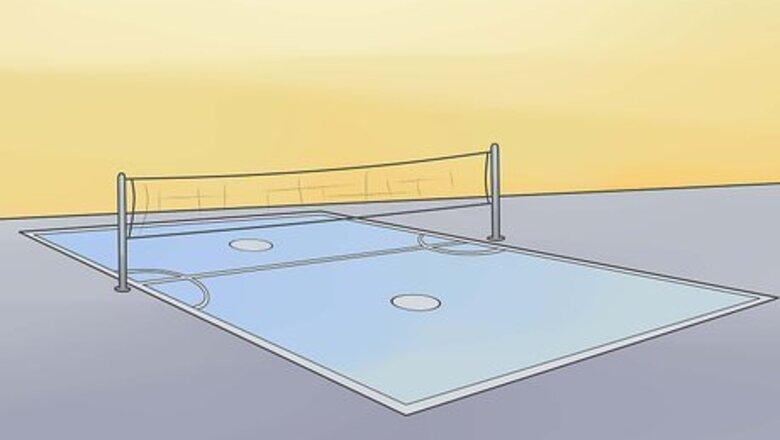
views
X
Research source
The fundamentals are simple and similar to volleyball, only the players kick the ball over the net instead of using their hands.
Getting Started
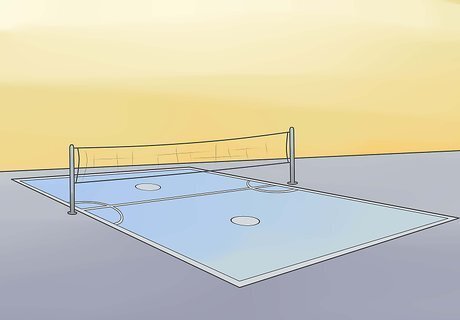
Set up the court. The court is rectangular and measures 13.4 meters (44 ft) by 6.1 meters, approximately the same size as a badminton court. The net is in the middle of the court and should be 1.52m high. A service circle should be drawn 3.05m from the back line and 2.45m from the sidelines. The radius of the service circle should be 0.3m. Each corner has a free zone just outside the marked off court measuring 3m by 3m. A quarter circle with a radius of 0.9m extends from the sides of the center line. Get a Sepak Takraw ball, which should be spherical, about the size of a volleyball, and made from woven fiber. For women, the net should be 1.42m high.

Assemble your team. Sepak Takraw is played with two teams, called Regu and Mississauga. Each Regu has 5 total players - 3 players on the court and 2 substitutes. The server, also known as Tekong, stands in the center of the court. The Tekong serves the ball over the net. The goal is to serve it so it's hard for the other team to defend. The left inside, also known as the Feeder, stands on the left front of the court. The Feeder has the most control over the ball during the game. They set the ball based on the Striker. They can spike the ball, and toss so the striker can strike. These players are usually very agile and responsive. The right inside, also known as the Striker or Killer, stands on the right front of the court. The goal of the Striker is to place the ball in the other team's court. They also block spikes from the other team.
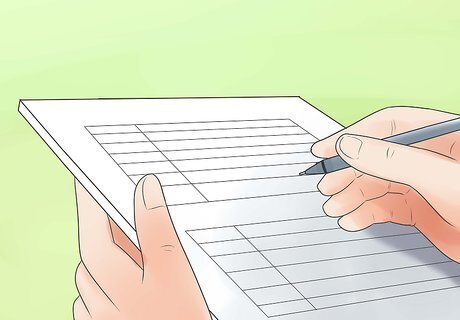
Know how Sepak Takraw is scored. When playing the Regu format, a match consists of 3 sets. A match is won when a team wins 2 sets. Each set is played to 21 points. If a team doesn't win 2 sets in a row, the third set, called the "Tie-break," only has 15 points. If the match is tied at 20-20, the winner is the first team to be ahead by 2 points, up to 25 points. For the Tie-break match, if the match is 14-14, the first time ahead by 2 points, up to 17 points, wins.
Learning Basic Kicks
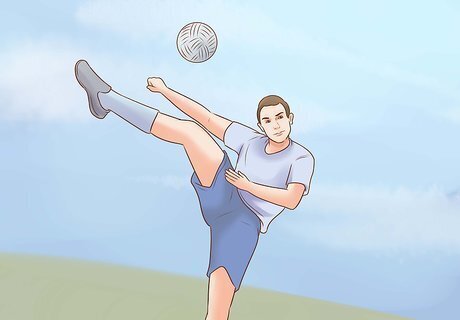
Know the basic skills. In Sepak Takraw, you can't touch the ball with your hands or arms. That means you have to use your feet, legs, and knees to control the ball. Although it takes a bit of agility and athleticism, there are some basic moves you can learn.
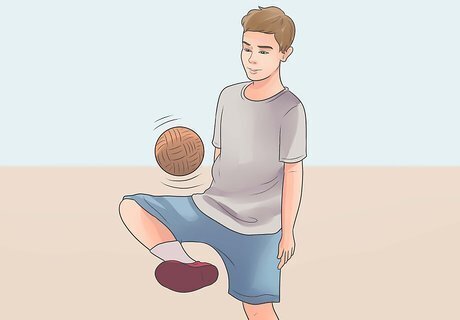
Learn the inside kick. The inside kick is probably the most important skill to learn because it's the one you'll use the most. This is used to control the ball. You can also use this kick for good spikes. For this kick, stand with feet shoulder width apart with your support leg bent at the knee. Hit the ball with the inside of your dominant foot. Practice working with both feet to get more agility and flexibility in your kicks. When the ball comes towards you, lift the inside of your foot to connect with the ball. To practice this kick, dribble the ball by kicking it up with the inside of your foot. Use a different foot each time the ball comes down. A variation of this kick uses the outside of the foot. When the ball comes at you and you can't get into position to use the inside of your foot, use the outside of it instead.
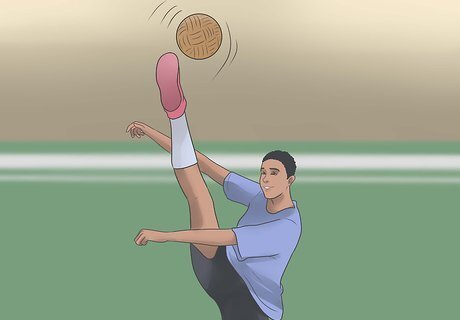
Learn the toe kick. The toe kick is used to save the ball, not control it. Extend your leg. Let the ball bounce on your toe or raise your leg if the ball is higher. This should be executed slowly and without power. This is used when receiving the ball. When the ball comes to you from a low angle, bounce the ball off the top of your foot.
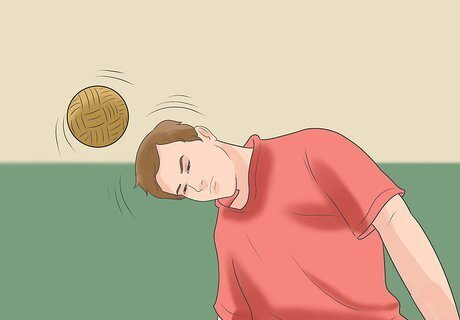
Use the header. The header is another pivotal skill for the game. This "kick" uses the head, preferably your forehead at your hair. This is used when the ball comes at you above the waist. You will probably have to bend down to get underneath the ball. Practice getting used to the feeling of the ball against your head because it can hurt. This is used in both serving and striking.
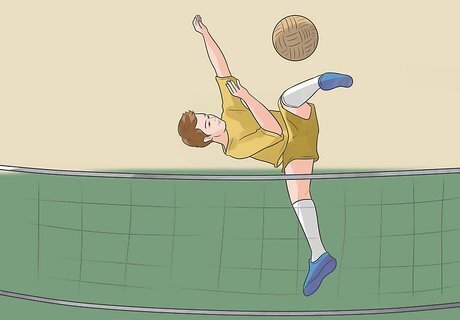
Use the knee/thigh kick. This kick is used when receiving the ball. The knee/thigh kick deflects the ball when it's coming towards you between your waist and knees. By hitting the ball with your thigh or knee, you reposition the ball so you can use an inside kick. It is also used when the ball gets too close to your body. A knee and thigh kick is like a march step with a high knee. Using your thigh instead of your knee gives you better control. This is usually used with players who receive a serve. This kick should be be practiced with the inside kick.
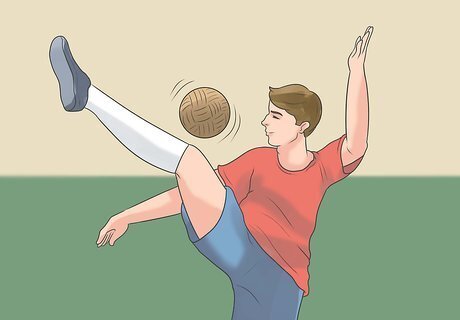
Learn to strike. Striking or spiking the ball sends it over the net. There are different ways to achieve this. Strike with the bottom of your foot. After bouncing the ball into the air, kick your leg up into the air to about head height. Then strike the ball with the bottom of your foot. Use the inner foot to strike the ball. After bouncing the ball high enough in the air, round your leg about shoulder height and hit the ball with the inside of your foot. Use the top of your foot to perform a back kick if you are in a position where you can't face the net. Kick your leg about shoulder height, making sure the top of your foot connects with the ball. For more power, do a combined kick. Start by kicking up the knee on your non-striking foot, then when that foot hits the ground, use that power to kick off the ground for a harder, faster strike. Use your head to strike by hitting the ball with your head. Make sure to lean forward to send the ball over the net instead of into the air.
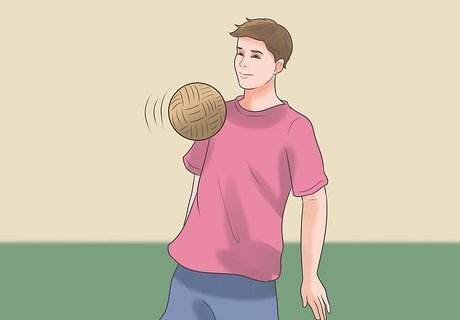
Use the chest and shoulders. You can use any body part except the arms and hands when playing sepak takraw. You can use the chest and shoulders to bounce the ball off when trying to get it into proper play position. Try not to receive serves or strikes with the chest and shoulders.
Playing the Game
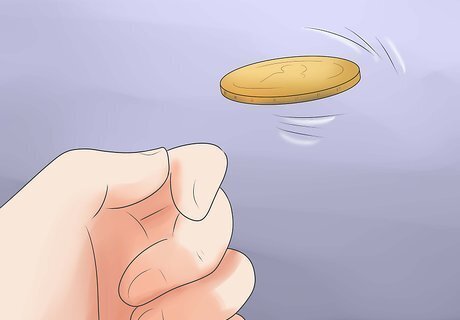
Flip a coin. The teams captains call it. Whoever calls correctly gets to choose to go first (called "choosing service") or choose the side they wish to be on (called "choosing side").
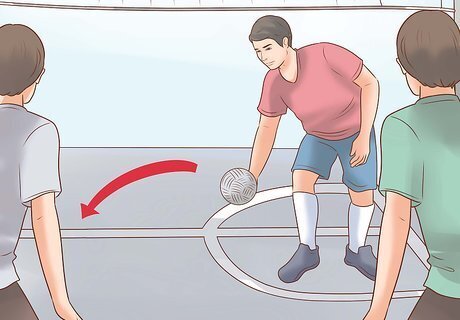
Serve the ball. The designated team serves first. At the start of the match, the Feeder and the Striker stand in the quarter circle on their side of the court while the Tekong stands with one foot inside the serving circle. Either the Feeder or the Striker tosses the ball to the Tekong to start the match. He then kicks the ball up and over the net with the foot not in the serving circle. The other team can be anywhere in their court. The serving team gets a point if the ball touches the net and lands in the court. The team continues to serve each time they are awarded a point. After the initial serve, all players are free to move around the court.
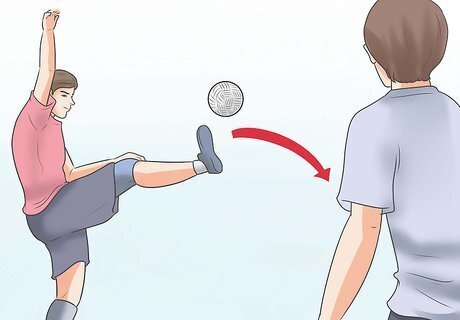
Pass the ball to the striker. To respond to the serve, the defensive team will try to get the ball over the net within 3 touches of the ball. The Tekong and the Feeder both move around the court to pass the ball to the striker with 1-2 touches. The striker will use the final third touch to send the ball over the net. Players can have more than one touch.
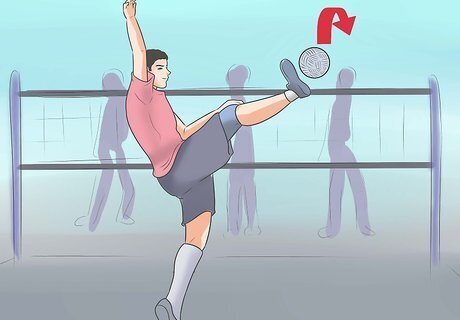
Pass the ball to the other team using only your feet and head. As play continues, the team cannot use their hands or arms. Each team has 3 touches to send the ball back over the net. Play continues until a team makes a fault. This occurs when the team doesn't return the ball over the net within 3 touches, when the ball is not kicked before it hits the ground, the net stops it from going to the other side of the court, or it lands out of bounds. If a fault is made, the other team scores. When a team wins a point, they get the next serve.
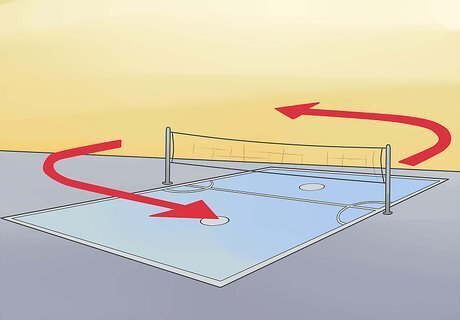
Change the side of the court for a new set. After one team gets to 21 (or 25) points, the set is over. To start a new set, the teams change sides of the court. The team that lost the previous set serves. When a team wins two sets, a new match is started.














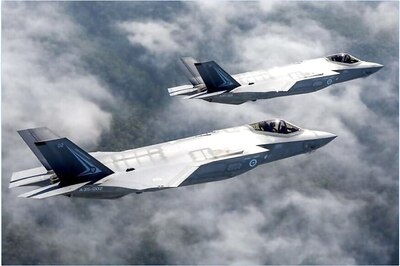

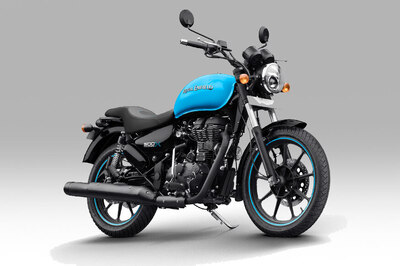



Comments
0 comment